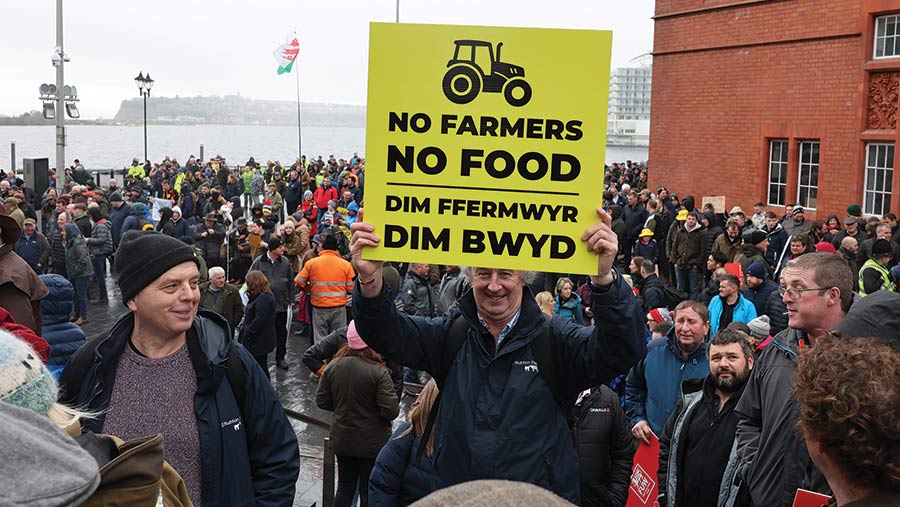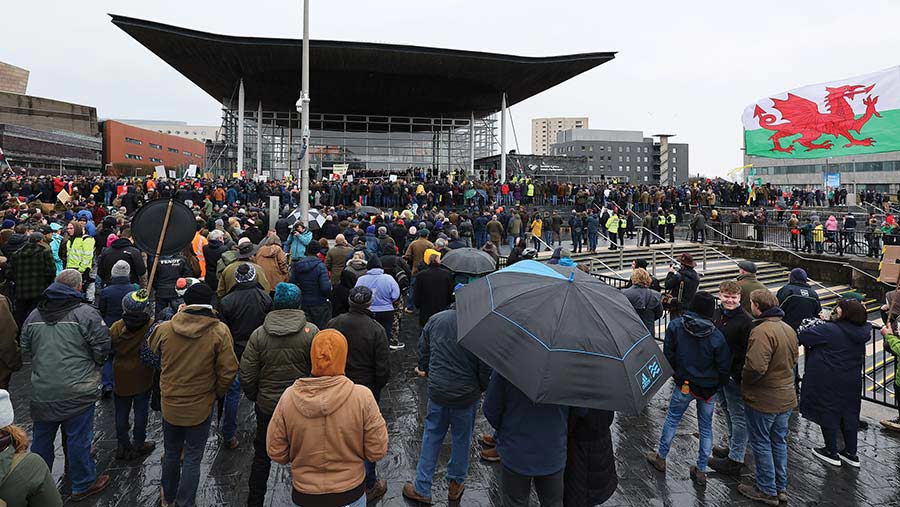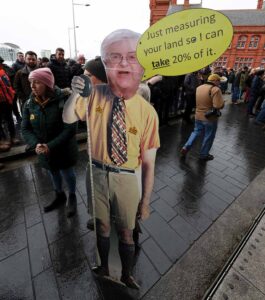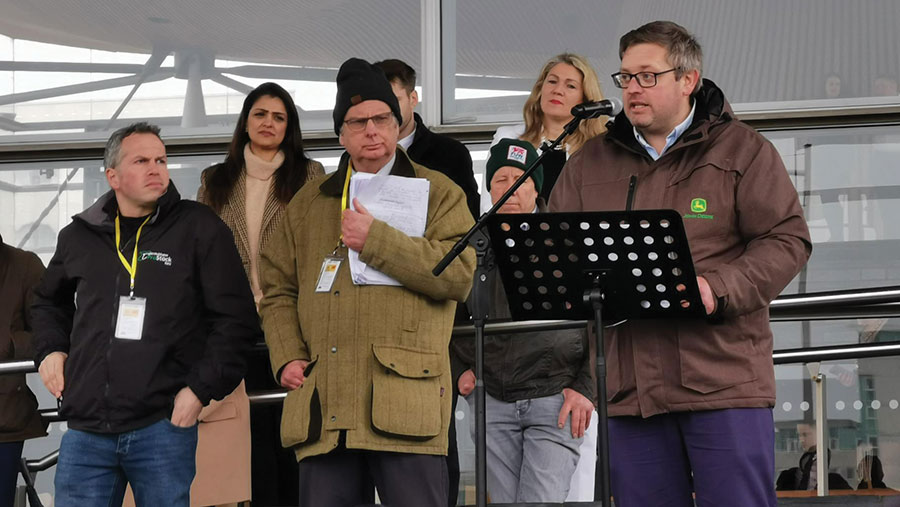Farmers will lose industry without action, warn Welsh protesters
 © Gareth Everett/Huw Evans Agency
© Gareth Everett/Huw Evans Agency “If You Tolerate This Your Children Will Be Next” blared the Manic Street Preachers’ anthem from a speaker on the stage outside the Senedd during a mass farmer protest.
The prophetic lyrics symbolised the concerns felt by many thousands of Welsh farmers who converged on Cardiff on Wednesday (28 February) for the peaceful protest against the Welsh government’s farming policies, especially on the Sustainable Farming Scheme (SFS).
Speaking at the protest, which was organised by farmers Stuart Williams and Liam Price and attended by representatives of both Welsh farm unions, Plaid Cymru MS Llyr Gruffydd told how the Welsh miners lost their industry 40 years ago, followed by the steelworkers at Port Talbot.
He warned that farmers will be next, if they don’t stand up against the Welsh government’s plans for farming.
See also: Angry Welsh farmers stage go-slow tractor protest
“This is no different. Rural Wales has exactly the same right to be standing up for its own livelihood – and that’s exactly what we’re doing,” said Mr Gruffydd.
“But when we see an [SFS] impact assessment that tells us 5,500 jobs will disappear, let alone the other jobs within the wider food and drink sector in Wales, when that tells us £200m will be lost to the sector – well, that isn’t just transition.”

© Gareth Everett/Huw Evans Agency
Farmers are furious about the Welsh Labour administration’s SFS proposals, which would require all farms to devote at least 10% of their land to trees, plus a further 10% for wildlife habitat to qualify for public funding in future.
Farm leaders are also calling for a review of the Welsh government’s bovine TB eradication programme and an assessment of a pan-Wales approach to nitrate vulnerable zone (NVZ) regulations, which will place limits on slurry spreading and require farms to invest in expensive slurry infrastructure upgrades.
In an impassioned speech, former international rugby referee Nigel Owens, who now farms cattle on a 40ha plot in Carmarthenshire, warned the Welsh government’s farming policies risk farmers’ livelihoods.
“There can be no Six Nations rugby game in Cardiff against France next week with no referee. There can be no food on the table if there are no farmers,” said Mr Owens, to rapturous applause.
Welsh government statement
Ahead of the protest, the Welsh government released a statement promising to continue to listen carefully to the concerns expressed by farmers and farming unions about some of its policies.
Welsh rural affairs minister Lesley Griffiths confirmed the appointment of a Bovine TB Technical Advisory Group, as previously announced in November. “Its first priority will be to look at the current on-farm slaughter policy and provide advice to ministers, as a matter of urgency,” she said.

© Gareth Everett/Huw Evans Agency
Some £20m of funding will also be made available to help farmers comply with NVZ regulations (although NFU Cymru was quick to point out this was not new money), and a new round of the Nutrient Management Investment Scheme will be launched shortly.
Ms Griffiths also agreed to look at alternatives to tree planting as a way of capturing more carbon.
On the SFS, the Welsh government vowed that the incoming first minister, who will take up post on 20 March, will carefully review the results of the consultation and consider in detail the pace of implementation of the SFS, which closes for consultation on 7 March.
Farmers’ Union of Wales president Ian Rickman said it was positive to see some steps being considered on the SFS.
But he vowed to continue to lobby Welsh government ministers “to change direction on their TB policy and discuss the way forward on the agricultural pollution policies”.
TB policy ‘most incompetent ever’, says farmer
A farmer forced to quit dairying following a major bovine TB breakdown has described the Welsh government’s agricultural policy as “the most incompetent policy ever to be written”.
Stuart Williams suffered a major TB breakdown in his dairy herd in 2019, and told the crowds gathered outside the Senedd of the devastation it caused.

© MAG/Philip Case
“As a fourth-generation dairy farmer – it’s in our blood,” he explained. When the herd first went down with TB, he said that: “We lost seven that day, 15 on the next test, and from then on it was over 20 [each time].
“Over the next three years, lorryloads were taken until we had the final phone call stating the remaining bovines on the farm were being depopulated – almost 600 animals were removed in a three-year and one-month period, all with paperwork stating “no visible lesions for TB”, all cultures were negative, and we were left with nothing,” he said.
Mr Williams recalled that during those three years, he experienced a lack of communication and continuity, with a huge question mark placed over his business and livelihood.
“Physically, financially, mentally – there was no light at the end of our tunnel,” he said.
